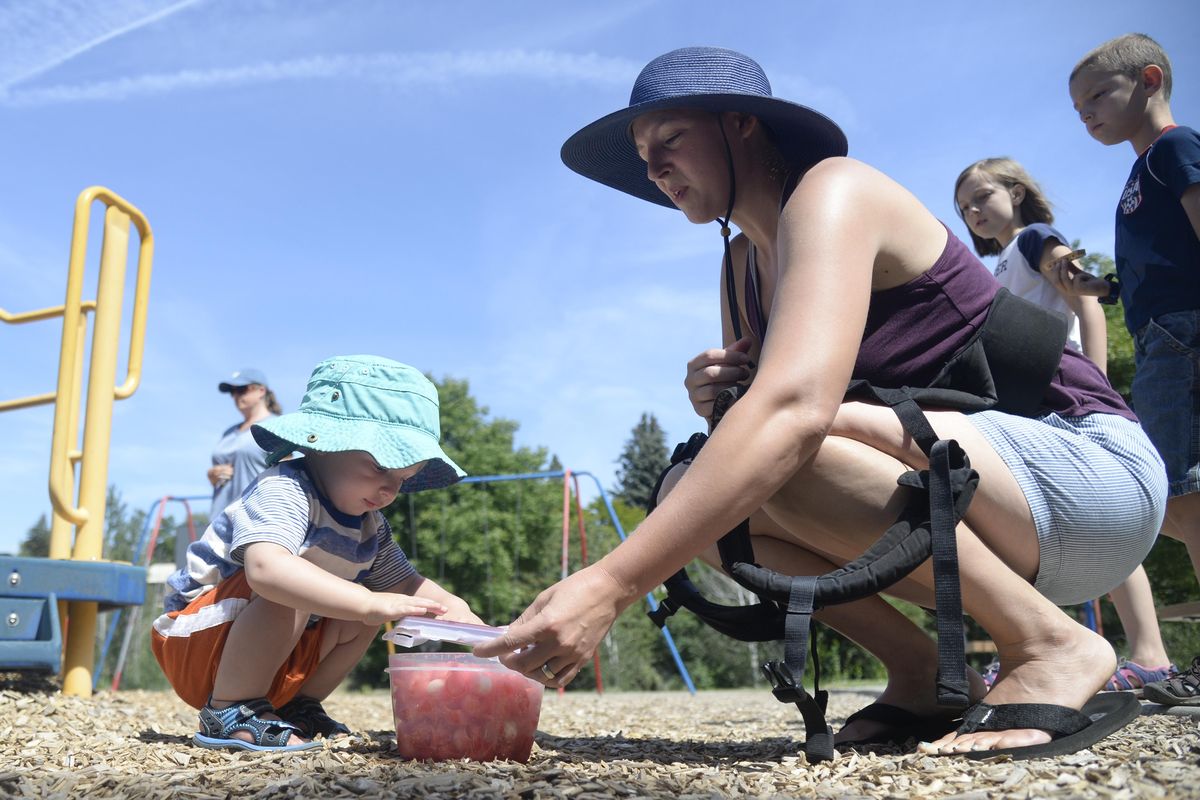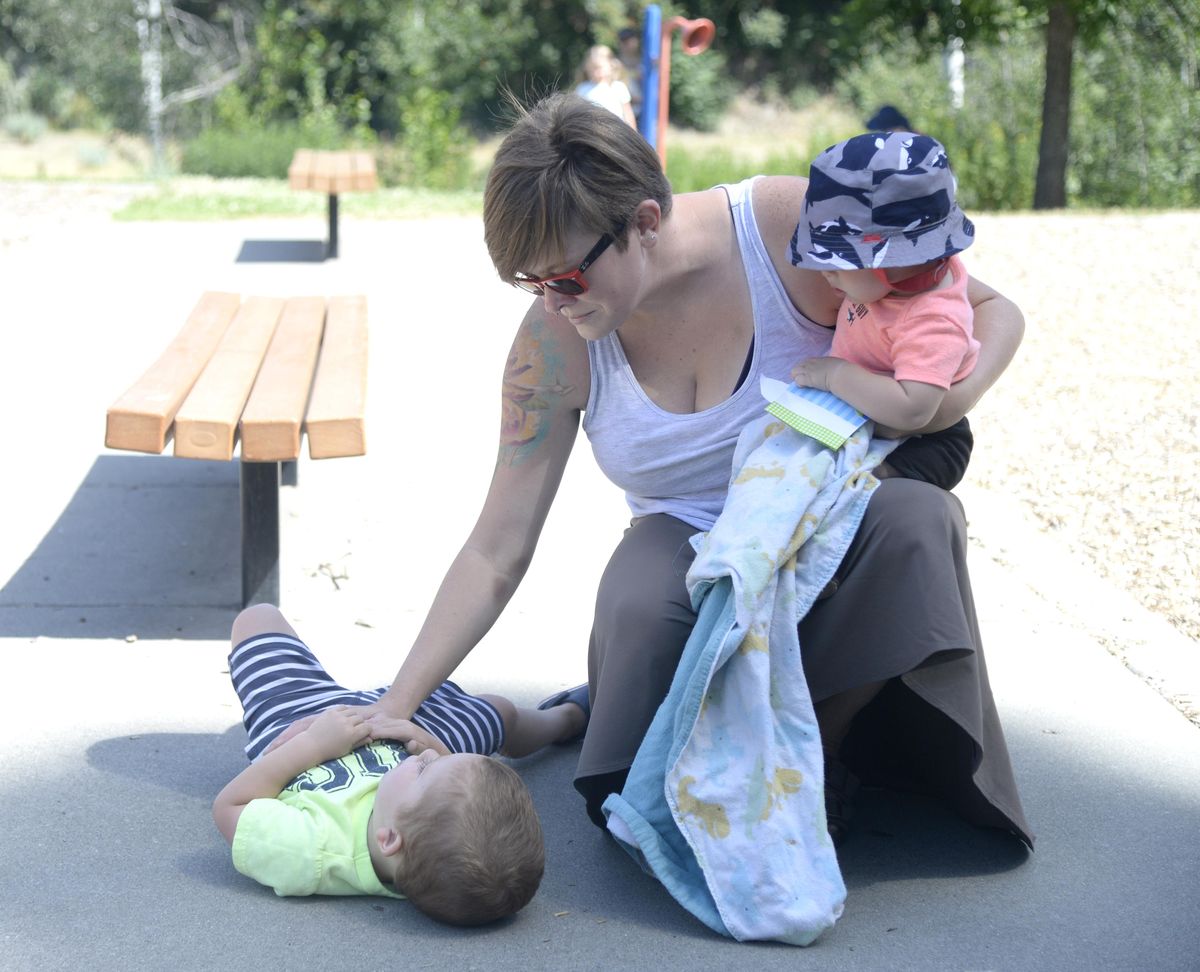Attachment parenting group bonds over shared philosophy
Elisabeth Lindsey, right, opens a snack of watermelon balls for her son Roland, left, at a play date Friday at Polly Judd Park for moms and kids of Attachment Parenting Village, a Facebook group that focuses on the issue of bonding with and raising their young children. (Jesse Tinsley / The Spokesman-Review)Buy a print of this photo
On a recent Friday morning, a handful of minivans lined the cul-de-sac next to Polly Judd Park, a neighborhood park tucked away on the lower South Hill. It was the weekly gathering of the Attachment/Conscious Parenting Village, a local Facebook group.
Several moms chatted with one another on this sunny day as they watched their kids swing, slide and run, filling the playground area with happy kid noises, laughter and sometimes a wail.
Elisabeth Lindsey, mother to 4-year-old Evie and 2-year-old Roland, has been a member of the group since 2012.
Lindsey said a friend recommended she check out the mamas group, and she now depends on the other moms for socializing, as well as online discussions and support.
The philosophy behind attachment parenting is to raise children who can form healthy, emotional connections with other people throughout their life, which begins by forming a respectful, compassionate connection between parent and child.
Attachment parenting is sometimes misunderstood or misinterpreted by the general public, Lindsey says, but for her, the term refers to practices such as baby wearing, co-sleeping arrangements, gentle discipline and breast-feeding.
Baby wearing, when a caregiver carries a baby either on the front or the back of the body in a cloth baby carrier, is believed to promote attachment between parent and child, and results in emotional security, proponents say.
Co-sleeping is another term for a “family bed,” or parents sleeping with their child or children.
Lindsey says that while lots of parenting topics get discussed in the online forum, the weekly outings give moms a chance to socialize, as well as practice skills and interactions.
“I should say that it’s less of a formal meeting and more of a play group in person. Most of the questions and discussions happen on our Facebook group page,” Lindsey said. “In person, it’s more about spending time with like-minded families and having our kids play, though things do come up in an organic way and get discussed.”
“We do all have a similar hope for how we want to raise our kids and we feel comfortable and our kids feel part of the group,” she added.
Another mom, Katrina Wilhelm-DeVries, helped her daughter Nola, 4, and her 2-year-old son, Dutch, with snacks at a nearby picnic table. As she handed out watermelon, she said she’s long been a proponent of breast-feeding and family bed sharing, as well as gentle discipline and respect for her children.
“But, we all have a little different philosophy; it varies with each family,” Wilhelm-DeVries said.
Even with her own mother, she said she had to explain her motives with attachment parenting.
“She thought she was a bad mom because I wanted to do things differently, and that if she had been a good mom I would have wanted to follow in her footsteps,” she said.
The group provides support for women who may feel judged by their families or peers for doing, or not doing, what is deemed “normal,” say many moms in the group.
“Members of my family are not doing the same type of parenting,” Wilhelm-DeVries said. “My brother and his wife did things much like our parents did with their first child, and that created some conflict. Now they have another child and we see them doing things more similar to attachment parenting.”
She feels strongly enough about her parenting philosophy that, “we just say, ‘This is how we’re raising our children,’” and leave it at that.
Lindsey said the issue of how to deal with family when they don’t agree with parenting choices comes up frequently in online discussions, as well.
“That’s a big one, especially with ‘cry it out’ and baby wearing,” Lindsey said. “They have the concept that these things will lead to ‘spoiled children,’ which attachment parenting and conscious parenting do not agree with.”
On one hand, she says, there are proponents of the “cry it out” method, where the baby is left alone to cry in the hope that he or she will eventually stop. Attachment parenting, on the other hand, calls for responding immediately to a crying baby and attempting to soothe them.
Baby wearing is also a matter of choice, but Lindsey said it has been a huge convenience for her to “wear” the baby.
She said she does dishes and housework all while carrying the baby, and it also allows her to tend to her older daughter at the same time.
Melanie Bennett, mother to 2-year-old Blake, recently joined the group after moving to Spokane from Palm Springs, California. She’s now closer to family in Spokane and in Montana, and, “it’s a good place to raise kids.”
As another toddler approached her son and pushed him down, Bennett cautioned the toddler to be gentle.
“I keep telling myself I have to speak up for him because no one else is going to,” Bennett said. “It’s harder for me to navigate how to talk to other people’s kids. But in this group you can say something to my child and I won’t be offended.”
Several moms agree that discipline is a hot button.
“We discourage physical and corporal punishment of any kind. We do set clear boundaries, but we have an understanding of where they are developmentally. It’s a struggle, but we look for ways to provide gentle discipline,” Wilhelm-DeVries said. “I have a very strong-willed daughter, so we struggle with letting her be her own person, but not everything can go her way … so it’s a struggle to set structure.”
Lindsey said one of the misconceptions about attachment parenting is that the kids never hear no, or have boundaries set for them.
“But that’s not true. It’s just that boundaries are set compassionately, and with respect, understanding that no one likes to hear no, or have to stop something they are doing, so it’s about giving them time to transition, or acknowledging that sometimes it’s hard to do that,” she said.
Lindsey said attachment parenting was a description of what was already her natural instinct.
“And learning to trust myself instead of what the world is saying is the right way to parent,” she said. “And that can require having a community you trust to test things out with. That’s why I have tried to reiterate that we don’t have to all do things the same way to be part of this group.”
In the group, people can gauge in a real scenario what works for them and what doesn’t, she said.
“And other times, it’s just nice to hear that all of us moms have days that go hilariously off track, and to have someone to laugh it off with.”

